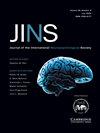神经性厌食症青少年从正反馈中学习的能力发生改变
IF 2.6
4区 心理学
Q2 CLINICAL NEUROLOGY
Journal of the International Neuropsychological Society
Pub Date : 2024-09-18
DOI:10.1017/s1355617724000237
引用次数: 0
摘要
目的:神经性厌食症(AN)的特点是严重限制卡路里摄入量,尽管饥饿会带来严重的医学和心理后遗症,但患者仍会持续厌食。之前的一些研究发现,神经性厌食症患者的反馈学习能力受损,但这是否反映了他们从正反馈(即奖励)、负反馈(即惩罚)或两者中学习的障碍,以及这种障碍在多大程度上与病情严重程度和病程长短有关,尚未得到澄清。研究方法参与者为患有自闭症的女性青少年(76人)和健康青少年志愿者(38人),年龄在12-18岁之间,完成一项概率强化学习任务。使用贝叶斯强化学习模型分别计算正反馈的学习率。探索性分析检验了反馈学习与病程、饮食失调严重程度以及自我/父母报告的奖惩敏感性之间的关联。结果显示青少年厌食症患者从积极反馈中学习的比率明显低于正常人。在负反馈学习或整体任务表现测量方面,患者与正常人没有差异。反馈学习参数与病程、进食障碍严重程度或基于问卷的奖惩敏感性报告无明显关联。结论患有自闭症的青少年在反馈学习方面表现出局限性的缺陷,这种缺陷与病程长短或报告的奖惩敏感性无关。后续的纵向研究应探讨从积极反馈中学习的差异是否与患有AN的青少年的病程有关。本文章由计算机程序翻译,如有差异,请以英文原文为准。
Altered learning from positive feedback in adolescents with anorexia nervosa
Objective: Anorexia nervosa (AN) is characterized by severe restriction of calorie intake, which persists despite serious medical and psychological sequelae of starvation. Several prior studies have identified impaired feedback learning among individuals with AN, but whether it reflects a disturbance in learning from positive feedback (i.e., reward), negative feedback (i.e., punishment), or both, and the extent to which this impairment is related to severity and duration of illness, has not been clarified. Method: Participants were female adolescents with AN (n = 76) and healthy teen volunteers (HC; n = 38) between the ages of 12–18 years who completed a probabilistic reinforcement learning task. A Bayesian reinforcement learning model was used to calculate separate learning rates for positive and negative feedback. Exploratory analyses examined associations between feedback learning and duration of illness, eating disorder severity, and self/parent reports of reward and punishment sensitivity. Results: Adolescents with AN had a significantly lower rate of learning from positive feedback relative to HC. Patients and HC did not differ in learning from negative feedback or on overall task performance measures. Feedback learning parameters were not significantly associated with duration of illness, eating disorder severity, or questionnaire-based reports of reward and punishment sensitivity. Conclusion: Adolescents with AN showed a circumscribed deficit in learning from reward that was not associated with duration of illness or reported sensitivity to reward or punishment. Subsequent longitudinal research should explore whether differences in learning from positive feedback relate to course of illness in youth with AN.
求助全文
通过发布文献求助,成功后即可免费获取论文全文。
去求助
来源期刊
CiteScore
5.40
自引率
3.80%
发文量
185
审稿时长
4-8 weeks
期刊介绍:
The Journal of the International Neuropsychological Society is the official journal of the International Neuropsychological Society, an organization of over 4,500 international members from a variety of disciplines. The Journal of the International Neuropsychological Society welcomes original, creative, high quality research papers covering all areas of neuropsychology. The focus of articles may be primarily experimental, applied, or clinical. Contributions will broadly reflect the interest of all areas of neuropsychology, including but not limited to: development of cognitive processes, brain-behavior relationships, adult and pediatric neuropsychology, neurobehavioral syndromes (such as aphasia or apraxia), and the interfaces of neuropsychology with related areas such as behavioral neurology, neuropsychiatry, genetics, and cognitive neuroscience. Papers that utilize behavioral, neuroimaging, and electrophysiological measures are appropriate.
To assure maximum flexibility and to promote diverse mechanisms of scholarly communication, the following formats are available in addition to a Regular Research Article: Brief Communication is a shorter research article; Rapid Communication is intended for "fast breaking" new work that does not yet justify a full length article and is placed on a fast review track; Case Report is a theoretically important and unique case study; Critical Review and Short Review are thoughtful considerations of topics of importance to neuropsychology and include meta-analyses; Dialogue provides a forum for publishing two distinct positions on controversial issues in a point-counterpoint format; Special Issue and Special Section consist of several articles linked thematically; Letter to the Editor responds to recent articles published in the Journal of the International Neuropsychological Society; and Book Review, which is considered but is no longer solicited.

 求助内容:
求助内容: 应助结果提醒方式:
应助结果提醒方式:


